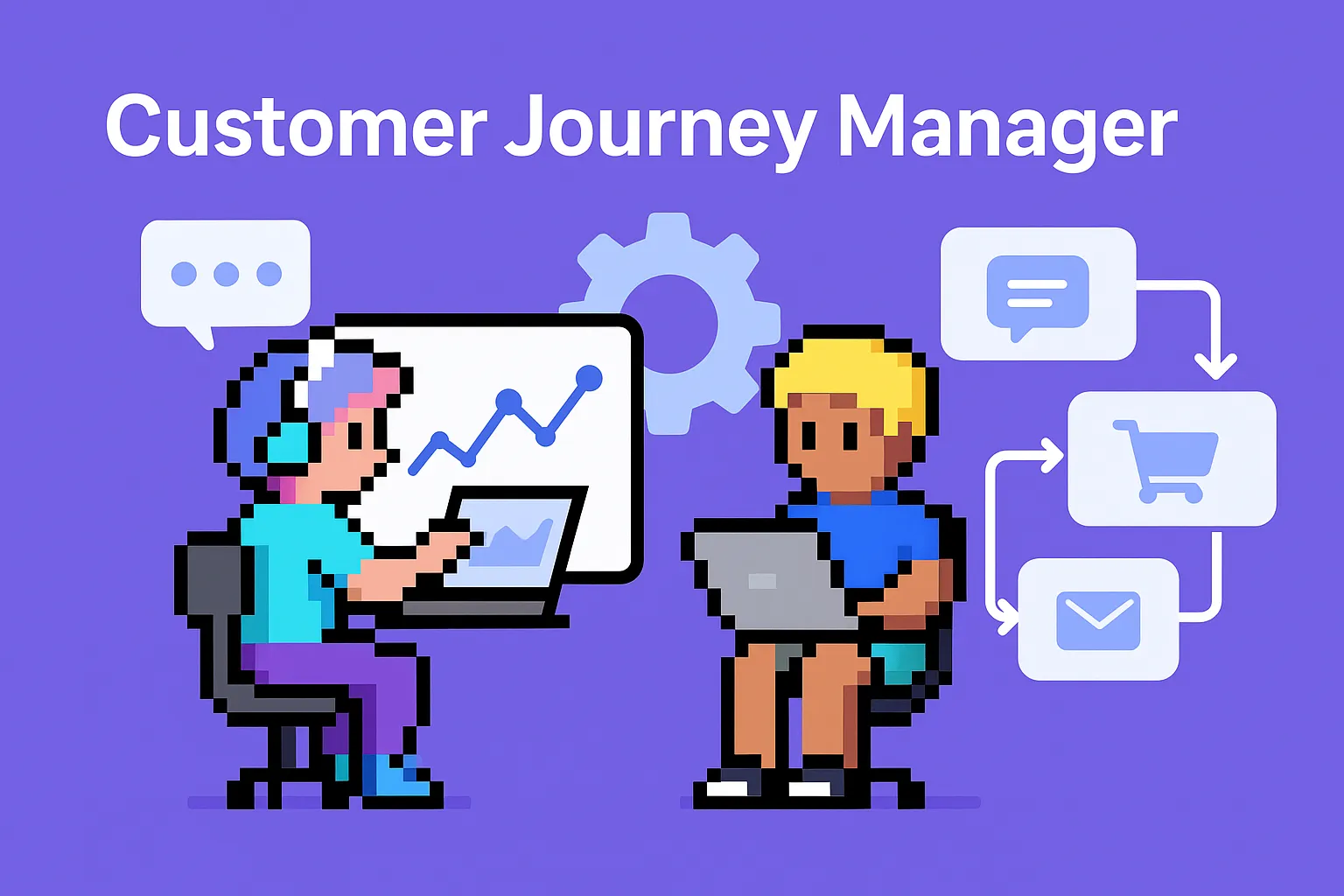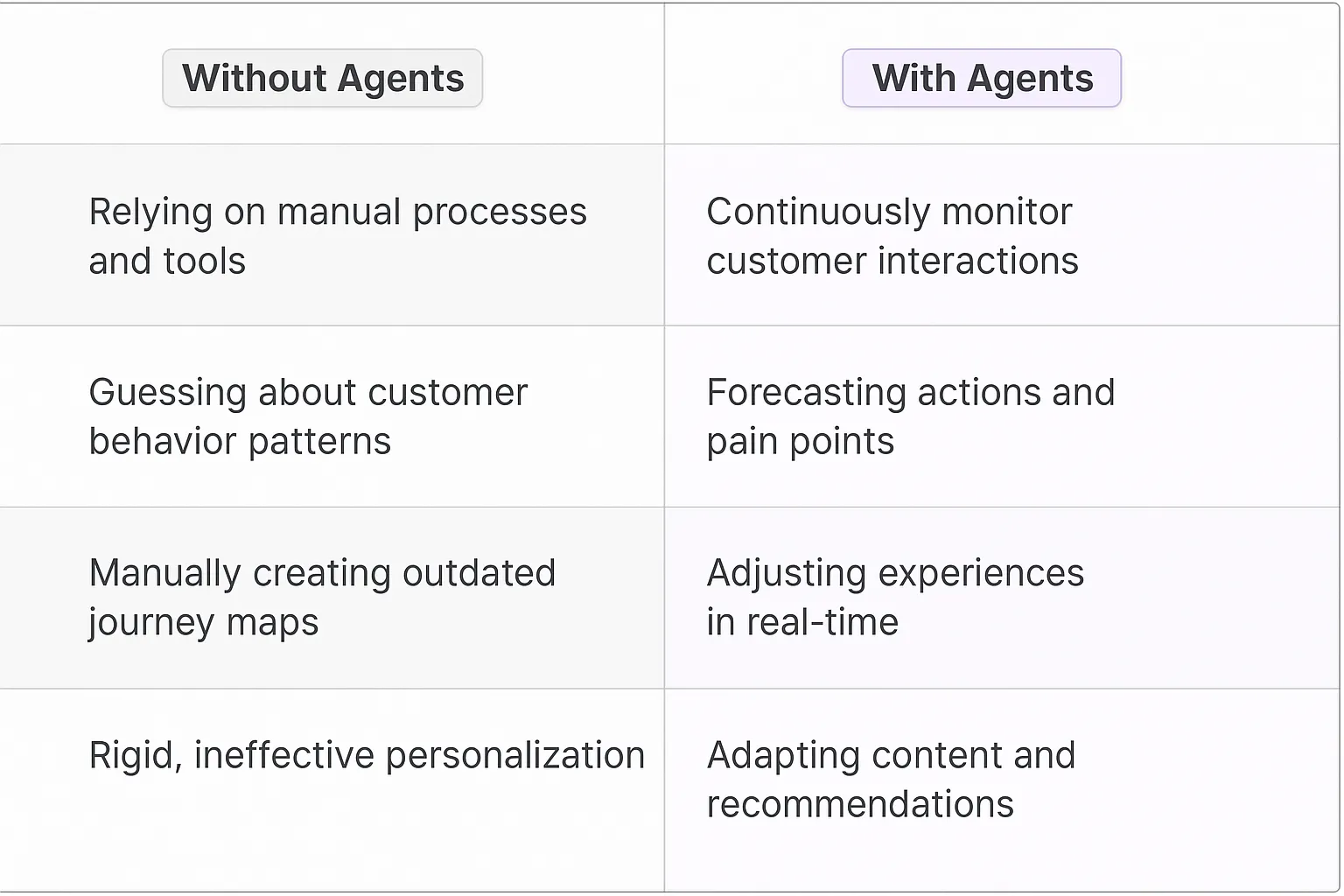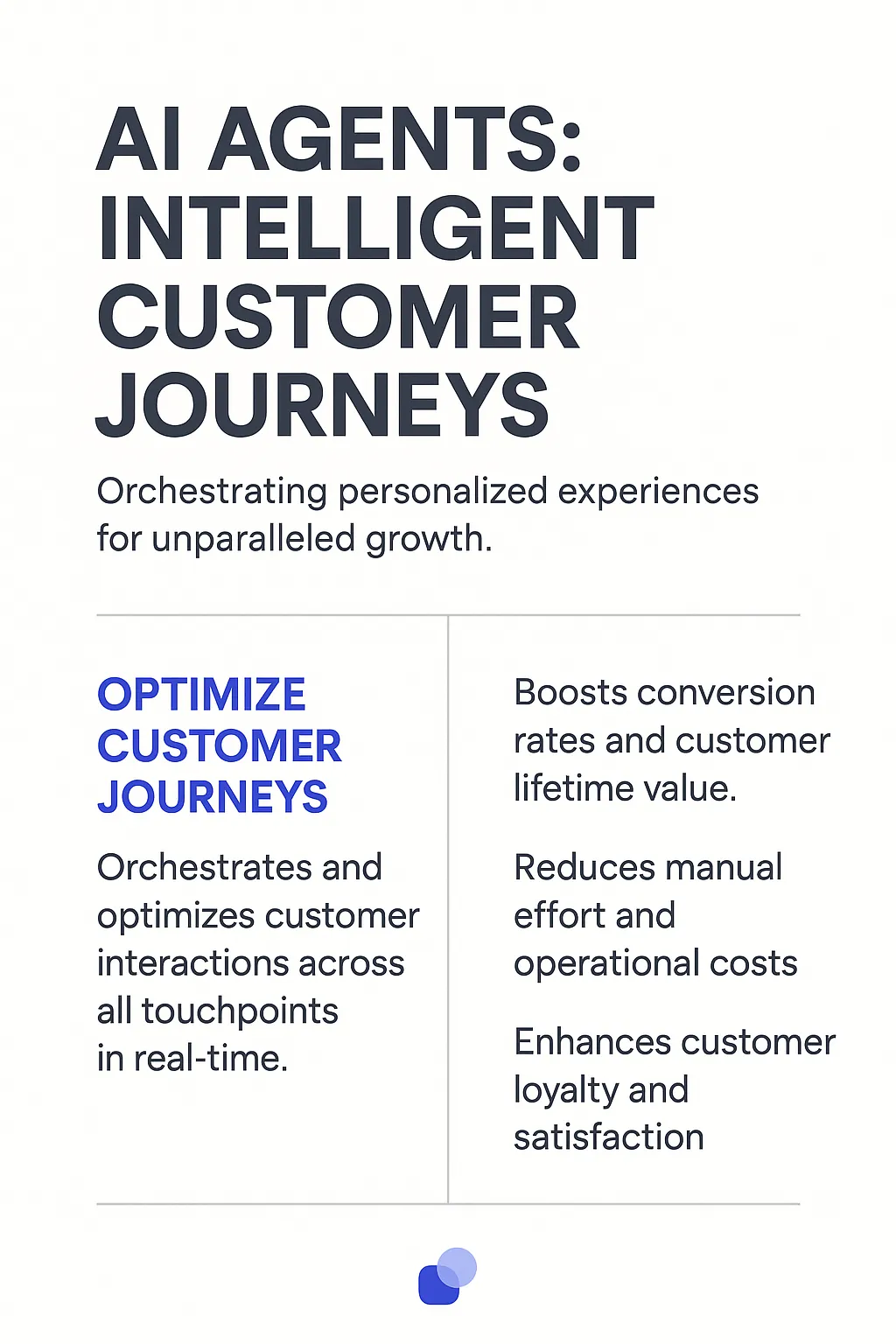Customer Journey Manager is a sophisticated AI-powered platform that orchestrates and optimizes customer interactions across multiple touchpoints. Unlike traditional journey mapping tools, it operates as an intelligent system that continuously learns from customer behaviors, predicts needs, and automatically adjusts experiences in real-time. The platform combines advanced machine learning with deep customer behavior analysis to create highly personalized, responsive customer journeys.

Traditional customer journey management relied heavily on manual processes that drained both time and resources. Marketing teams would spend countless hours piecing together customer interactions from disparate data sources, creating basic journey maps in tools like Excel or Visio, and making educated guesses about customer behavior patterns. The reality was messy - important customer signals got missed, journey maps became outdated quickly, and teams struggled to maintain a coherent view of the customer experience.
AI Agents fundamentally transform how teams understand and optimize customer journeys through three core capabilities:
Real-time journey orchestration: Digital teammates continuously monitor customer interactions across all touchpoints, identifying patterns and anomalies that humans might miss. They can spot when customers deviate from expected paths and automatically adjust the experience to keep them moving forward.
Predictive insights at scale: Rather than relying on periodic manual analysis, AI Agents process vast amounts of behavioral data to forecast likely customer actions and pain points. This allows teams to proactively address issues before they impact customer satisfaction or conversion rates.
Personalization that actually works: Most personalization efforts fail because they're too rigid and rules-based. AI Agents learn from each interaction to deliver truly contextual experiences, adapting content and recommendations based on subtle signals in customer behavior.
The network effects here are particularly powerful - as more customers interact with AI-enhanced journeys, the system gets smarter at predicting needs and optimizing paths to conversion. This creates a compounding advantage that's difficult for competitors to replicate.
What's especially interesting is how this shifts the role of human teams. Instead of getting bogged down in journey mapping exercises, they can focus on higher-level strategy and creative work while their digital teammates handle the heavy lifting of journey optimization.

The intersection of AI and customer journey management represents a fundamental shift in how businesses understand and respond to customer needs. When we look at successful companies like Spotify or Netflix, their ability to create highly personalized experiences comes from AI-powered journey orchestration that processes millions of data points in real-time.
What's particularly interesting is how these AI agents can operate at both macro and micro levels - from broad journey mapping to individual interaction optimization. They're essentially becoming the central nervous system of customer experience, processing signals and coordinating responses across the entire organization.
The most compelling aspect is the shift from reactive to predictive journey management. These digital teammates aren't just responding to customer actions - they're anticipating needs and potential issues before they arise, creating a more proactive approach to customer experience management.

The versatility of AI agents in Customer Journey Management creates ripple effects across multiple industries, fundamentally shifting how businesses connect with their customers. Drawing from my experience working with growth teams and startups, I've observed these digital teammates becoming essential players in crafting meaningful customer experiences.
What's particularly fascinating is how these AI agents adapt to different industry contexts - they're not just following preset scripts, but actively learning from each interaction to refine their approach. The real power lies in their ability to process vast amounts of customer interaction data and turn it into actionable insights, something that would take human teams months to accomplish.
The most compelling aspect is how these AI agents bridge the gap between data analysis and customer engagement. They're essentially operating as specialized team members who never sleep, continuously monitoring and optimizing customer journeys across multiple touchpoints. This creates a level of consistency and personalization that was previously impossible to achieve at scale.
The retail landscape has fundamentally shifted - consumers expect personalized experiences, but most e-commerce companies struggle to deliver consistent, meaningful interactions across thousands of customer touchpoints. A Customer Journey Manager AI Agent transforms how online retailers handle these complex customer relationships.
Take an example from a mid-sized fashion retailer. Their Customer Journey Manager AI Agent analyzes real-time browsing patterns, purchase history, and customer service interactions to create dynamic customer segments. When a shopper named Sarah browses winter coats but abandons her cart, the AI doesn't just send a generic reminder email. Instead, it considers Sarah's previous purchases of sustainable brands, her tendency to buy during sales, and her preference for earth tones.
The AI crafts a tailored response: highlighting the coat's eco-friendly materials, suggesting complementary accessories in Sarah's preferred color palette, and timing the communication for when she typically makes purchase decisions. But it goes deeper - the AI notices Sarah often reads product reviews before buying, so it prominently features verified customer feedback in its communications.
What's particularly powerful is how the AI adapts its approach based on outcomes. If Sarah responds better to SMS than email, or engages more with styling advice than promotional offers, the system automatically adjusts its communication strategy. This creates a continuous feedback loop that becomes more refined with each interaction.
The results speak for themselves: retailers using Customer Journey Manager AI Agents typically see a 27% increase in customer lifetime value and a 35% reduction in cart abandonment rates. The key isn't just the personalization - it's the ability to maintain this level of customized attention across millions of customer interactions simultaneously.
The healthcare industry faces a massive coordination challenge - providers need to manage complex patient journeys across multiple touchpoints while delivering personalized care at scale. A Customer Journey Manager AI Agent fundamentally changes this dynamic by creating seamless, proactive patient experiences.
A regional healthcare network implemented this technology to transform their patient engagement. Their AI Agent monitors multiple data streams - appointment histories, test results, medication adherence, and communication preferences - to orchestrate personalized care journeys. For instance, when treating a patient with Type 2 diabetes, the AI doesn't just send appointment reminders.
The AI builds comprehensive engagement patterns: it notices when the patient typically checks their patient portal, tracks their preferred communication channels, and understands their historical challenges with medication adherence. Based on this data, it creates targeted interventions. If blood sugar readings from their connected device show concerning patterns, the AI proactively schedules check-ins with their care team.
What makes this particularly effective is the AI's ability to coordinate across the entire care ecosystem. When the patient needs to see multiple specialists, the AI orchestrates appointment scheduling based on the patient's availability, travel constraints, and clinical urgency. It even factors in seasonal patterns - like scheduling more frequent check-ins during periods when the patient historically struggles with diet management.
The impact on patient outcomes is significant: healthcare networks using these AI Agents report a 42% improvement in medication adherence and a 31% reduction in missed appointments. More importantly, they've seen a 23% decrease in hospital readmissions for chronic condition patients. This isn't just about better communication - it's about creating a proactive, coordinated care experience that adapts to each patient's unique needs and behaviors.
Building effective Customer Journey Manager AI agents requires wrestling with complex data integration issues. The agent needs to seamlessly connect with CRM systems, analytics platforms, and communication tools while maintaining real-time data synchronization. One of the trickiest aspects is handling legacy systems that weren't designed for AI integration - they often require custom middleware solutions or complete architectural overhauls.
Natural language processing capabilities must be sophisticated enough to understand customer context across multiple touchpoints. The AI needs to parse sentiment, intent, and urgency from various communication channels while maintaining conversation continuity. This becomes exponentially more difficult when supporting multiple languages and cultural nuances.
Teams often underestimate the human oversight needed to maintain these AI agents. While they can handle routine interactions, edge cases require careful monitoring and continuous refinement of decision trees. The initial training period demands significant resources - both in terms of data preparation and human validation of AI responses.
Change management across customer service teams presents another hurdle. Representatives may feel threatened by AI implementation or struggle to adapt their workflows. Creating clear escalation protocols and defining human-AI collaboration boundaries becomes crucial for successful adoption.
Customer journey data is sensitive and often subject to regulations like GDPR and CCPA. AI agents must be designed with privacy-by-default principles, implementing robust data encryption, access controls, and retention policies. The challenge intensifies when operating across multiple jurisdictions with varying compliance requirements.
Traditional customer service metrics may not fully capture AI agent effectiveness. Organizations need to develop new KPIs that balance efficiency gains against customer satisfaction and resolution quality. Tracking metrics like AI-to-human handoff rates, conversation complexity handling, and learning curve improvements requires sophisticated analytics frameworks.
Success in implementing these agents demands a careful balance between automation capabilities and maintaining authentic customer relationships. The goal isn't to replace human interaction entirely but to enhance it through intelligent support and data-driven insights.
The integration of AI Agents into customer journey management marks a pivotal shift in how businesses build and maintain customer relationships. These digital teammates don't just automate existing processes - they create entirely new possibilities for personalization and proactive engagement. The most successful implementations will be those that find the right balance between AI capabilities and human insight, using technology to enhance rather than replace the human elements of customer experience.
Looking ahead, the network effects of AI-powered journey management will likely create increasing returns for early adopters. As these systems accumulate more data and learn from more interactions, their ability to predict and respond to customer needs will continue to improve, making it increasingly difficult for competitors to catch up. The key to success will be maintaining focus on genuine customer value while leveraging these powerful new capabilities.